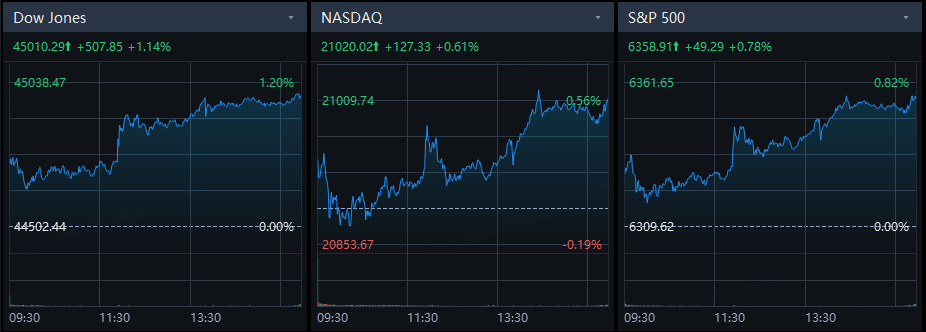Post-Bell | S&P 500 and Nasdaq Rally to Record Highs. Nvidia Rises 2%; AMD up 3%; GoPro Soars 12%; Texas Instruments Tumbles 13%

The S&P 500 and Nasdaq notched record high closes on Wednesday, lifted by Nvidia and GE Vernova, as the European Union and the U.S. appeared headed toward a trade deal similar to an agreement President Donald Trump struck with Japan.
The White House's deal with the European Union would include a broad tariff of 15% on EU goods imported into the U.S., two diplomats said. The rate, which could also extend to cars, would mirror the framework agreement the U.S. has struck with Japan.
Market Snapshot
The S&P 500 climbed 0.78% to end the session at 6,358.91 points. The Nasdaq gained 0.61% to 21,020.02 points, while the Dow Jones Industrial Average rose 1.14% to 45,010.29 points, just short of its December 4 record high close. Advanced Micro Devices rose 3%.

Market Movers
Alphabet shares added 2% in overnight trading after Alphabet’s earnings and revenue for its second quarter exceeded analysts’ expectations. The tech giant reported earnings of $2.31 per share and revenue of $96.43 billion, while analysts had expected $2.18 per share and $94 billion in revenue, per LSEG.
ServiceNow jumped 7% in overnight trading. ServiceNow lifted its full-year guidance for subscription revenue, calling for a range of $12.775 billion to $12.795 billion. That compares to its earlier outlook for $12.64 billion to $12.68 billion and the FactSet consensus call for $12.66 billion. ServiceNow also beat on the top and bottom lines in the second quarter.
Chipotle Mexican Grill shares of the burrito chain dropped 9% in overnight trading. Chipotle cut its outlook for same-store sales growth for the full year. The company now sees growth being flat, compared to its earlier call for growth in a low single-digit range. Revenue for the second quarter missed the mark, landing at $3.06 billion, compared to the LSEG consensus estimate of $3.11 billion.
Tesla Motors shares fell 4% in overnight trading. Tesla said its automotive revenue came in at $16.7 billion in the second quarter, down from $19.9 billion in the year-ago period. This marks the second straight quarter of falling auto revenue for Tesla. Top- and bottom-line results for the second quarter also missed analysts’ estimates.
Viking Therapeutics slipped 8% in overnight trading after the company posted a second-quarter loss of 58 cents per share, while analysts polled by FactSet expected a loss of 45 cents per share. The company’s research and development expense of $60.2 million also exceeded the anticipated $45.1 million.
Shares of GE Vernova Inc. surged to 15% an all-time high on Wednesday after the power equipment maker raised its revenue and free cash flow forecasts and beat Wall Street estimates for second-quarter profit. GE Vernova has gained over 80% so far in 2025, with power consumption on track to hit due to growing demand from AI and cryptocurrency data centers.
Heavyweight AI chipmaker NVIDIA climbed 2.25% on Wednesday and fueled gains in the S&P 500 and Nasdaq.
Texas Instruments tumbled 13% on Wednesday after its quarterly profit forecast pointed to weaker-than-expected demand for its analog chips and underscored tariff-related uncertainty.
Shares of doughnut chain Krispy Kreme, Inc., nearly 32% of whose free float has been shorted, ended up 4.6% at $4.32 on Wednesday. Earlier the stock hit a session high of $5.73, with a record trading volume of more than 151 million shares.
Action camera maker GoPro's shares rose 12.4% to $1.54 after earlier hitting $2.37, the highest level since late March 2025 on Wednesday.
Market News
Trump Administration to Supercharge AI Sales to Allies, Loosen Environmental Rules
The Trump administration released a new artificial intelligence blueprint on Wednesday that aims to loosen environmental rules and vastly expand AI exports to allies, in a bid to maintain the American edge over China in the critical technology.
President Donald Trump marked the plan's release with a speech where he laid out the stakes of the technological arms race with China, calling it a fight that will define the 21st century.
The plan, which includes some 90 recommendations, calls for the export of U.S. AI software and hardware abroad as well as a crackdown on state laws deemed too restrictive to let it flourish, a marked departure from predecessor Joe Biden's "high fence" approach that limited global access to coveted AI chips.
“Autonomy Is the Story,” Musk Says, but Tesla's Autopilot Production 'Several Months Behind'
After reporting second quarter results that were not as bad as Wall Street feared, Tesla Motors executives, including CEO Elon Musk and CFO Vaibhav Taneja assured investors that the company has ambitious plans for its robotaxi service, full self-driving (FSD), and plans for a more affordable electric vehicle, despite regulatory headwinds, production challenges, and negative impacts from both tariffs and provisions within the “Big Beautiful Bill” that was recently passed into law.
Because of the company’s focus on the robotaxi rollout in Austin last month, production release of autopilot is “several months behind,” Musk said on the company’s earnings call, but remains a “huge selling point” that will drive sales in Europe once autonomous driving is comparable to the U.S.
“We’ll get the [regulatory] approvals in Europe,” Musk assured, and hope to unblock regulatory “challenges” in China soon.







